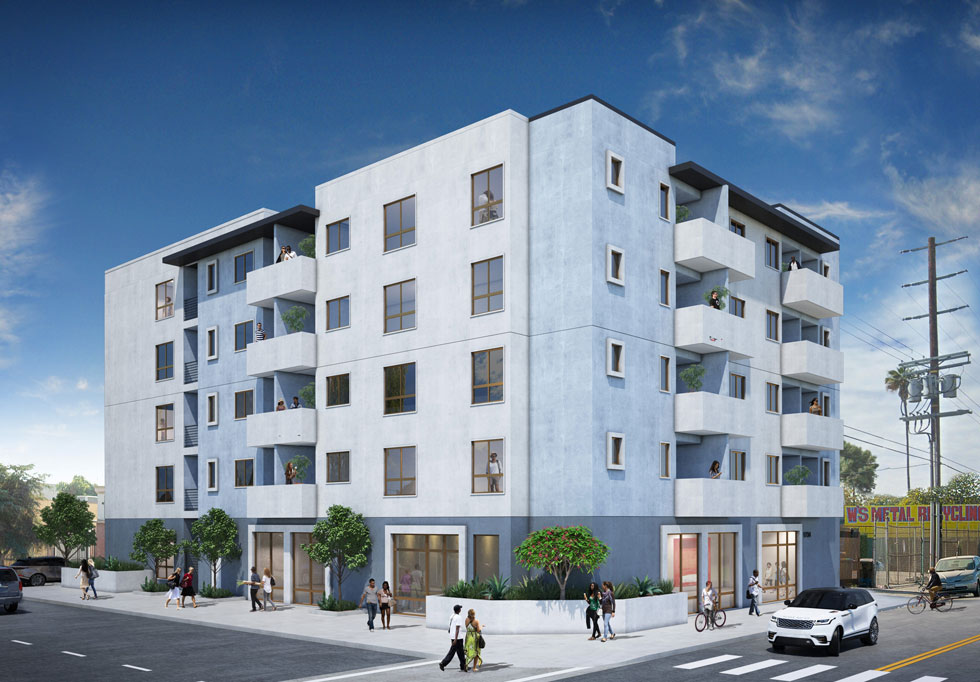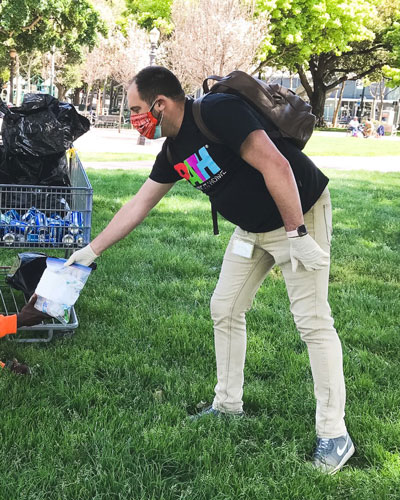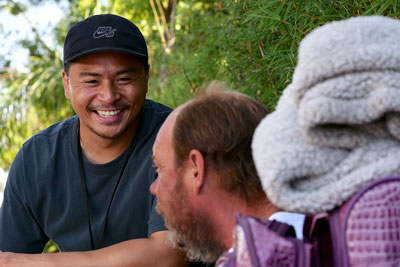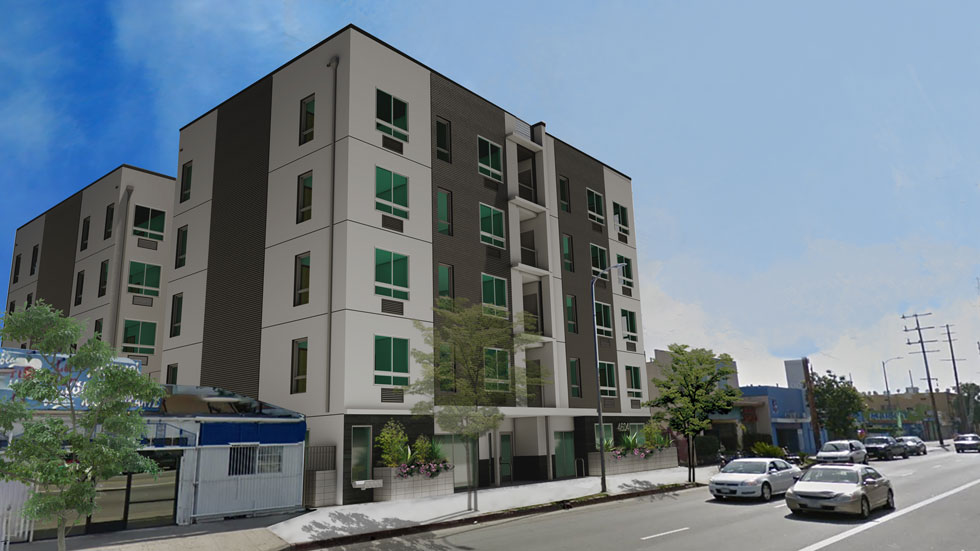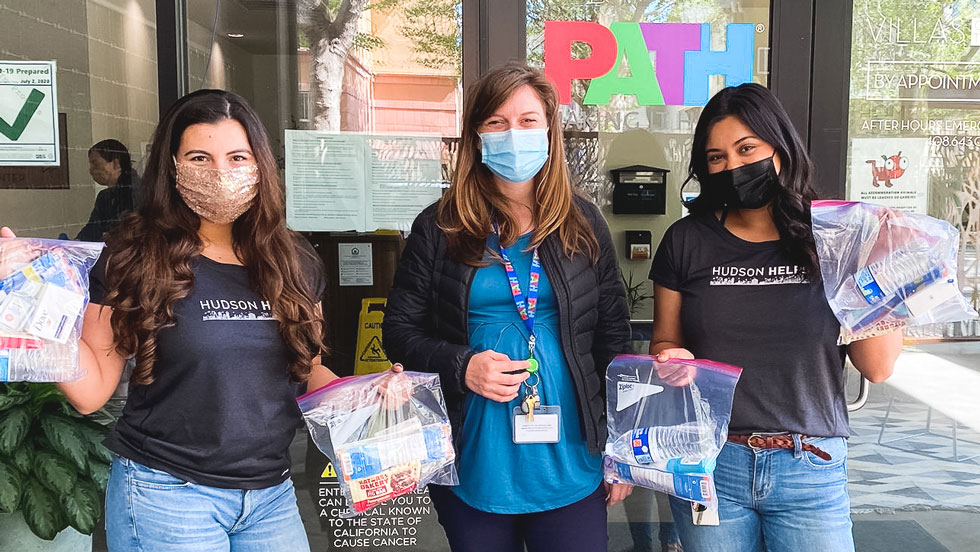A five-year, $20 million pledge by Hudson Pacific Properties, Inc. (NYSE: HPP) to help increase the supply of affordable housing and support the homeless in its core West Coast markets is being seen by local organizations as a significant commitment toward solving one of the nation's key social challenges.
According to the 2019 Annual Homeless Assessment Report to Congress released in 2020, more than half of the nation's unsheltered homeless are in California. The state has approximately 150,000 people experiencing homelessness, 72% of whom are unsheltered.
Hudson Pacific, which owns and develops office and studio space for the media and tech industries, has witnessed the crisis firsthand. Many of the communities where it operates have been hit hardest, including downtown Los Angeles, Hollywood, Santa Monica and the Mid-Market area of San Francisco.
"If you look at a map, these areas are the epicenters of the homelessness crisis here," says Natalie Teear, senior vice president, innovation, sustainability, and social impact at Hudson Pacific.
In Los Angeles County alone there has been a 49% increase in total homelessness since 2015. "We feel really strongly that what's going on is totally unacceptable. We have a moral obligation to try to help," says Teear, who spearheads Hudson Pacific’s efforts to address homelessness.
The Los Angeles-based REIT's $20 million pledge is part of a multi-pronged approach that includes both impact investments and philanthropic donations, in addition to continued community outreach, and on-the-ground volunteer efforts.
Thriving Communities
Teear says that Hudson Pacific believes in creating long-term vibrant, thriving communities for all. "We also think that it’s in the best interest of our business, tenants, and property values that we do something to address this issue."
Stephen Fiechter, senior director for Metro Los Angeles programs at People Assisting the Homeless (PATH), a nonprofit organization that helps individuals and families successfully transition from living on the street to homes of their own, says Hudson Pacific "is really at the forefront of recognizing the need to do something and to have it be in a solution that involves everybody."
Hudson Pacific’s commitment to addressing the homelessness crisis in California is part of the REIT's larger Better Blueprint corporate responsibility platform, which serves as the foundation for its work on environmental, social, and governance (ESG) issues. "Like any company with an ESG program, there is a wide landscape of issues we could focus on, but we believe it's more effective to focus on a smaller number of issues and commit deeply and drive meaningful change, than try to tackle everything at once and have less impact," Teear says.
Over the years, Hudson Pacific has made numerous contributions to local organizations assisting those experiencing homelessness, including one to the Los Angeles Union Rescue Mission, which provides food, shelter, education, counseling, and long-term recovery programs. Other organizations Hudson Pacific has contributed to include: Safe Parking L.A., PATH in Los Angeles and San Jose; North Beach Citizens in San Francisco, Downtown Emergency Service Center (DESC) and Wellspring Family Services in Seattle, and Covenant House in Vancouver.
Hudson Pacific provides more than dollars though. It is committed to partnering with local organizations like PATH to provide boots on the ground and encourages employee giving by providing its staff with 32 hours of paid volunteer time off annually and matching charitable contributions.
"From the perspective of a provider, we could not be more excited about working with Hudson Pacific because they not only bring financial resources, they bring real estate experience and history with the community, along with human resources," Fiechter says.
In recent years, Hudson Pacific volunteers and funds have helped PATH by assembling hygiene and care kits and Thanksgiving baskets, sponsoring a jazz night fundraiser, and taking part in PATH’s adopt-a-site program in Hollywood. "We have an emotional partnership with [Hudson Pacific] as well that provides the enthusiasm and support with volunteers and engagement of a wider community," Fiechter notes.
PATH was founded in the 1980s in West Los Angeles by a coalition of faith-based leaders and community members who recognized the need to assist those experiencing homelessness. It is now a state-wide organization. Its development arm, PATH Ventures, works with local communities and funding sources to build permanent supportive housing and has programs that provide case management and support services in those buildings and others.
PATH, along with the other organizations Hudson Pacific supports, operate with the broadly accepted and evidence-based, housing-first approach to helping those individuals experiencing homelessness that may face a variety of additional challenges, from employment, education substance abuse, or mental health. "None of those other challenges can really be tackled effectively if someone doesn't have a home," Teear says.
Time for Change
Unprecedented levels of inequality, skyrocketing housing prices, a paucity of affordable housing options, an urgent need for criminal justice reform, and the "utter collapse" of the mental health care system are just a few of the issues exacerbating homelessness in the U.S. and in California in particular, according to Teear. "It's hard to tell what the main cause is but the one thing we all can agree on is that it’s time for a change," she says.
"California is phenomenally expensive for a lot of reasons, like construction costs and lots of red tape," Teear says. "No one could envision building their way out of this crisis."
Hudson Pacific is also actively engaged in the newly-formed, Hollywood 4WRD community, an organization founded to bring community members and organizations together to collaborate and coordinate resources to end homelessness in greater Hollywood. Participating public and private stakeholders include real estate owners, businesses, faith-based community members, service providers, health organizations, law enforcement, and residents.
"We’re finding the real work ends up happening at the neighborhood level and Hollywood 4WRD is an example of that," Teear says. Both Teear and Fiechter serve on the board for Hollywood 4WRD, helping to brainstorm solutions for unhoused neighbors and improving the community.
Teear says Hudson Pacific is trying to focus on solutions that are innovative and have the potential to scale, "and on creating some type of breakthrough in this difficult logjam that the cities we serve are in."
Innovative Model
As part of this commitment, Hudson Pacific is investing $3 million with SDS Capital Group’s Supportive Housing Fund, which invests in the development of permanent, supportive housing across Los Angeles and the San Francisco Bay Area.
"SDS has come up with a really innovative model, they’re doing it at a third of the cost, and in less than half the time, so it’s really promising," Teear says.
Founded in 2001, SDS Capital Group launches and manages impact funds in different parts of the country. Each fund focuses on highly distressed and impoverished communities while generating a market rate of return for investors. SDS Capital currently has five different vehicle funds on its platform, with more than a billion dollars invested around the country. The SDS Supportive Housing Fund is their newest impact fund and has currently raised $122 million in investments and has a goal of reaching $150 million by August 2021.
SDS's funding approach is unique— instead of multiple different assets and developers, the funds raised go to support only one developer— RMG Housing, LLC, based in Los Angeles.
"We’re funding RMG because they have such a strong development model for permanent supportive housing and an innovative market-driven approach to developing units at a much cheaper cost," says Deborah La Franchi, founder and CEO of SDS Capital Group. SDS negotiated a limited partnership agreement with RMG to streamline the process and cut out additional legal red tape and delays in the development process.
RMG can then focus on constructing the housing and continuing new innovations in the permanent supportive housing field. Compared to the typical construction costs of $500,000 to $700,000 per single bedroom unit in the Los Angeles area, RMG is developing permanent supportive housing units for an average of $200,000 per unit.
Another factor that distinguishes SDS Supportive Housing Fund is its revolving structure. "We have six years to rotate that $150 million in capital that we will be using to finance 30 projects. We will fund the first 15 and then as we exit each one as the permanent financing is secured and our full investment is taken out, we receive a preferred return," La Franchi says. Those returns are then used to fund the second group of 15 projects.
This model provides equity to the transactions and is not a loan fund, which has made it enticing to contributors like Hudson Pacific.
"Our pledge is really about using our business—and both our charitable giving and investing dollars. This is primarily an impact investing vehicle where we plan to invest in solutions that address the homelessness crisis, but also return money to us," Teear says.
With the capital provided by the SDS Supportive Housing Fund, RMG aims to complete 30 supportive housing projects in six years, a drastically improved timeline compared to the five to seven years needed to complete just one typical permanent supportive housing project in California that requires government financing. Two-thirds of the investments will be in Los Angeles.
Strengthening Communities
With the funding commitment from Hudson Pacific Properties, SDS expects far-reaching results.
"With this model, the SDS Supportive Housing Fund is able to maximize the impact and the number of people that we can bring in off the street and provide housing for," La Franchi says. "We hope to see at least 1800 individuals’ lives absolutely transformed by this housing and that this will be a catalyst for other developments to help revitalize communities," she adds.
While the numbers are daunting, Hudson Pacific says the objective is clear. "Our goal is to help get people into housing. It’s so easy and straightforward, and yet it's so, so hard," Teear says. "It's critical from humanitarian and moral angles, and from a business angle as well, and we think it will make our communities more vibrant, thriving places."
"Hudson Pacific is really rising to the challenge—enthusiastically engaging with the community and leading by example so that we can actually move the needle forward," Fiechter adds.
Overcoming Misconceptions
One of the common misconceptions that Stephen Fiechter, senior director for Metro Los Angeles programs at PATH, encounters in his work is the general public's belief that those experiencing homelessness are inherently dangerous, with a tendency toward crime and drug use.
Other hurdles facing those experiencing homelessness include the cultural stigmatization of mental health that drives many people to the streets and the persistent misconception that people actively choose to forgo available resources in order to remain homeless. The COVID-19 pandemic has in many ways exacerbated these fears and societal barriers.
"People experiencing homelessness can often be physically challenged—oftentimes medically compromised—so one of the major concerns was that they would be extraordinarily vulnerable to the virus," Fiechter notes. In response, many shelters decompressed to allow for more space. There were also increased concerns about hygiene protocols. Additional resources were needed that helped PATH and other organizations house people in converted motels and hotels.
"One of the challenges now is to try to figure out how to implement those resources moving forward to create more permanent housing so that all the people who were brought in from the streets during the pandemic will have a place to go rather than back to the streets," Fiechter says.
PATH's partnership with Hudson Pacific continued during the pandemic and included the volunteer opportunities as well as virtual campaigns to raise funds supporting the work, Fiechter says.
